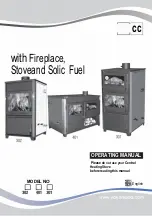
EN
W415-2884 / A / 09.21.20
43
troubleshooting (electronic)
14.0 troubleshooting (electronic)
!
WARNING
•
Always light the pilot whether for the fi rst time or if the gas supply has run out, with the glass door open or
removed.
•
Turn off gas and electrical power before servicing the appliance.
•
Appliance may be hot. Do not service until appliance has cooled.
•
Do not use abrasive cleaners
symptom
problem
test solution
Main burner fl ame is a
blue, lazy, transparent
fl ame.
(This is not applicable
in outdoor appliances)
Blockage in vent.
-
Remove blockage. In really cold conditions, ice buildup may occur
on the terminal and should be removed as required. (To minimize this
from reoccuring, the vent lengths that pass through unheated spaces
(attics, garages, crawl spaces) should be wrapped with an insulated
mylar sleeve).
Incorrect installation.
-
Refer to “venting” section to ensure correct installation.
Flames are consistently
too large or too small.
Carboning occurs.
Appliance is over-fi red or under-
fi red.
-
Check pressure readings:
Inlet pressure can be checked by turning screw (A) counter-clock-
wise 2 or 3 turns and then placing pressure gauge tubing over the
test point. Gauge should read as described on the chart below.
Check that main burner is operating on ‘HI’. Outlet pressure can be
checked the same as above using screw (B). Gauge should read as
described on the chart below. Check that main burner is operating
on ‘HI’.
After taking pressure readings, be sure to turn screws
clockwise fi rmly to reseal. DO NOT OVER TORQUE.
Leak test with a soap and water solution.
Air shutter improperly adjusted.
-
Return air shutter to specifi ed opening, see “
venturi adjustments
”
section in the installation manual.
Carbon is being
deposited on glass,
logs, rocks, media, or
combustion chamber
surfaces.
Air shutter is blocked.
-
Ensure air shutter opening is free of lint or other obstructions.
Flame is impinging on the glass,
logs, rocks, media or combus-
tion chamber.
-
Ensure the media is positioned correctly in the appliance.
-
Open air shutter to increase the primary air.
-
Check the input rate: check the manifold pressure and orifi ce size as
specifi ed by the rating plate.
-
Ensure door gaskets are not broken or missing and the seal is tight.
-
Ensure vent liners are free of holes and well sealed at all joints.
-
Check that minimum rise per foot (meters) has been adhered to for
any horizontal venting.
White / grey fi lm forms.
Sulphur from fuel is being depos-
ited on glass, logs, or combus-
tion chamber surfaces.
-
Clean the glass with a recommended gas fi replace glass cleaner.
DO
NOT CLEAN GLASS WHEN HOT.
-
If deposits are not cleaned off regularly, the glass may become
permanently marked.
Exhaust fumes smelled
in room, headaches.
Appliance is spilling.
(This is not applicable in outdoor
appliances).
-
Check door seal.
-
Check for exhaust damage.
-
Check that venting is installed correctly.
-
Room is in negative pressure; increase fresh air supply.
INSERT
PHOTO
OF VALVE
HERE
*Maximum inlet pressure not to exceed 13” w.c.
Pressure
Natural Gas
(inches)
Natural Gas
(millibars)
Propane
(inches)
Propane
(millibars)
Inlet
*7”
(minimum 4.5”)
17.4mb
(minimum 11.2mb)
13”
(minimum 11”)
32.4mb
(minimum 27.4mb)
Outlet
3.5”
8.7mb
10”
24.9mb
SENSOR
IGNITOR
(SPARK)
PILOT
TUBE















































